

HEART MATTERS
Ocea’s Heart Journey
By Ayla ChallengerOcea was born at home on a summer morning in Nanaimo She arrived with a powerful feeling of water, so we named her Ocea She was our second little girl, and we were happy to welcome her into our family. Everything seemed normal for the first few weeks, but our midwife was concerned that she wasn’t gaining weight. We had been told she had a heart murmur, so we went to the hospital for a checkup Her ECG and X-ray were deemed normal, so we left with a likely diagnosis of silent reflux.
IN THIS ISSUE
OCEA’S HEART JOURNEY WHAT’S HAPPENING?
CHN CELEBRATES THE HOLIDAYS!
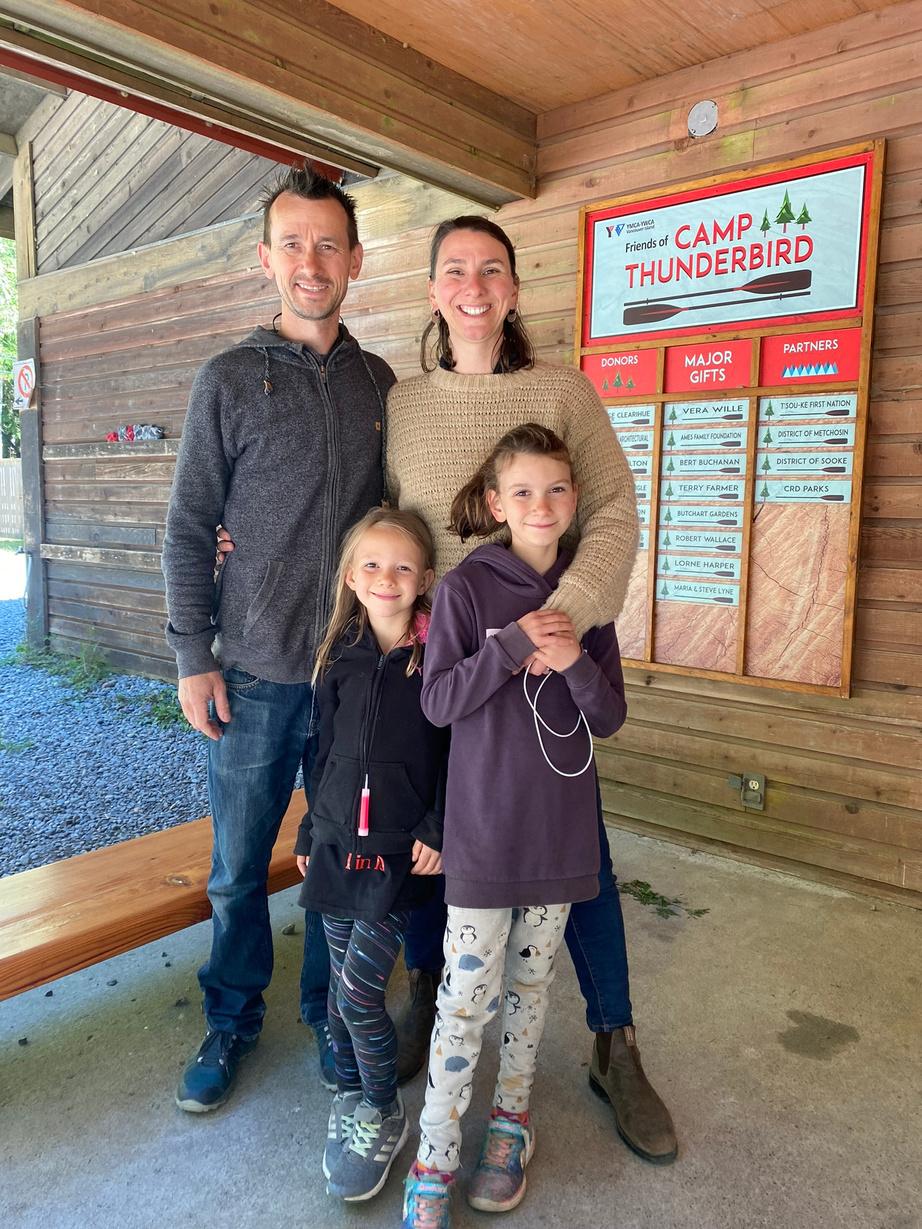
The next few weeks were up and down, some weeks Ocea gained weight and some weeks she didn’t We focused on milk supply, feeding position, and diet Staying home seemed to help and then it didn’t. It didn’t make sense as everything seemed so “ easy ” with our first baby. Just before a planned trip to Calgary Ocea had a week with no weight gain so our midwife pushed us to get her checked again at the hospital I told my whole story to a different pediatrician that day.
continued on page 3
PEDIATRIC CARDIOLOGY TRAVEL OUTREACH 2024 SCHEDULE
TRANSITIONING INTO ADULT CARE
MILA’S FUND IN ACTION MEET EMILY DEIMLING
WHAT’S HAPPENING
Growing Up with Heart Disease Conference returns this fall.
P H O T O B Y M A R T I N R S M I T H
Growing Up with Heart Disease is a collaborative 1-day conference by and for families and healthcare professionals. Families and healthcare professionals sharing and learning from each other’s experiences of caring for children and youth with congenital, acquired, and electrical heart disease.
Special programs for youth (ages 13 to 19) will be offered.
Healthcare professionals, parents and youth are welcome. We hope you will join us for the 2024 conference.
Stay tuned for further information and details.
Coffee Groups Near You
If you would like to organize a coffee group for heart parents in your community, please contact Sam Aitken at saitken@childrensheartnetwork org and we can get you set up with a coffee card for drinks and treats!
ABBOTSFORD – Rupe Brah - rupe3395@gmail.com
CHILLIWACK – Jenna Winterhoff - jennawinterhoff@gmail.com
LANGLEY – Meghan Fabbi - meghan.fabbi@gmail.com
NANAIMO – Sandy Barlow - sandygbarlow@gmail.com
VANCOUVER – Samantha Aitken - saitken@childrensheartnetwork org
TRACEY CARPENTER – President
KERRY HARDING – Vice-president
JEFF MERCER – Treasurer
JACKIE BONSAL – Secretary
BOARD & STAFF
BARB WILLSON – Member at large
JOELLY SEGAL – Member at large
LESLIE RAFFIN – Member at large
SONIA MILBRADT – Member at large
STEPHANIE ISAAC – Member at large
SAMANTHA AITKEN – Provincial coordinator
PATTY RIPPEL – Administrative assistant
EMILY DEIMLING – Lower Mainland Hearts of Gold youth coordinator
MEGAN MADSEN – Vancouver Island Hearts of Gold youth coordinator
ABOUT CONTACT US
Heart Matters is the newsletter of the Children’s Heart Network, which works to educate, support, and enhance the lives of children, youth, and families living with congenital heart disease
The views expressed in this newsletter are those of the authors, and not necessarily those of the board of the Children’s Heart Network. The best sources of medical information are your child’s physician and the health care professionals who provide care for your child.
@ChildrensHeartNetwork
@ChildrensHeartNetwork
@Childrens Heart
604 521-3037 | 1 877 833-1773
5151 Canada Way Burnaby, BC V5E 3N1 chn@childrensheartnetwork org
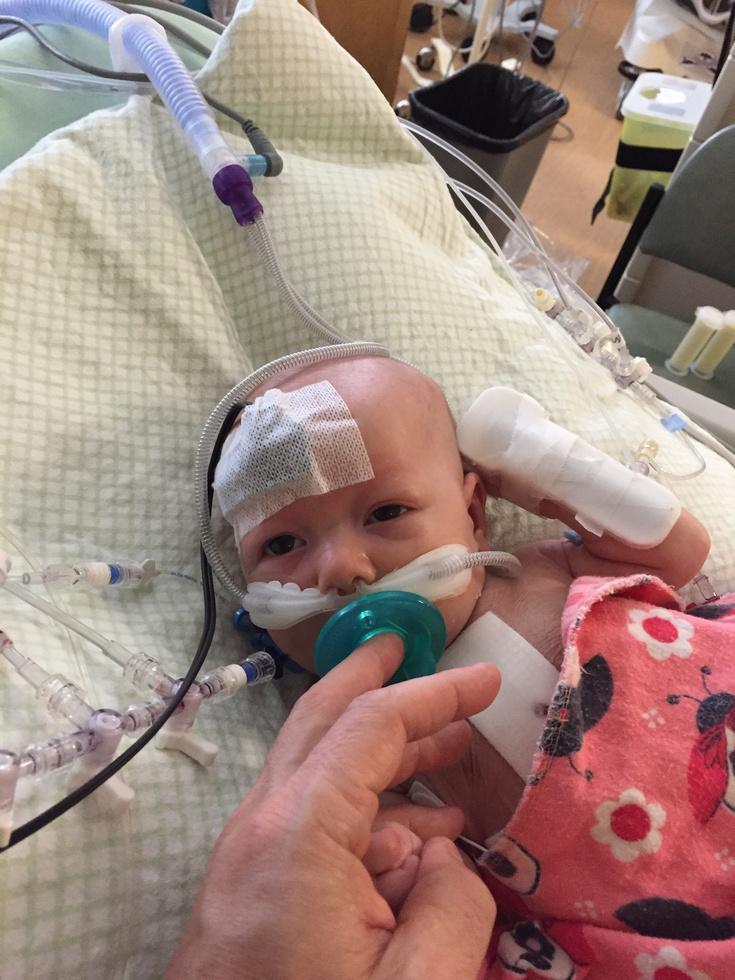
After listening to Ocea’s heart she called the pediatric cardiologist in Victoria and got us an appointment for the next day.
Ocea slept during the echocardiogram, and we watched the screen. The greyscale images and colour splashes were indecipherable. The Sonographer was skilled at getting images while chatting and asking about our drive from Nanaimo. Looking back, my husband Auren was impressed with her poker face that enabled our short-lived hope that this was just a routine scan.
After a short wait we were led into Dr Brian Sinclair’s office and asked to sit down He told us that Ocea had some “big stuff” going on with her heart. We listened carefully with semi-disbelief as he explained that Ocea had a major congenital heart defect called Truncus Arteriosus. Her pulmonary artery and aorta didn’t separate when her heart was developing, and she had a hole between the ventricles Her little heart was having to work incredibly hard to deliver oxygenated blood to her body, which is why she was not gaining weight
We now had the answer to why she was struggling, and it was more significant than we could have imagined There was some relief in knowing, but mostly a feeling of the bottom falling out from under us.
Ocea had to be admitted to the PICU in Victoria for observation. They gave us a room to sit in so we could make calls while they found a bed for Ocea I remember sitting and holding Ocea with all this new information going through my head. I knew I needed to start making calls, but I was frozen Dr Sinclair came in and I asked him “How do I tell my family?” He said, “ you say that Ocea has a major congenital heart defect and that she is going to need surgery ” Suddenly the weight of it all just hit me, and I fell apart. Crying, holding my beautiful baby in my arms, I took a breath, picked up my phone and started to make the calls
They found a little room for us close to Ocea, and we had a long fitful night without much sleep. We thought Ocea would have to stay in the hospital until her surgery (and then get airlifted to Vancouver) but she was stable enough that the doctors sent us home for the weekend. We felt present and connected to each moment with Ocea in a new way All the while we were sorting through our emotions about what was ahead.
The cardiac team at BC Children’s Hospital (BCCH) was good at bringing us up to speed, helping us to prepare, and answering our questions. The meeting with her surgeon, Dr Gandhi, was both reassuring and terrifying. Being in the presence of someone so talented and singularly focused gave us some confidence but discussing the risks and potential complications (without any padded language) was hard and very real.
Surgery prep, the night before, began with a bath. We soaked in Ocea’s presence and marveled at her every movement Her smallness and new fragility was balanced by her beautiful calm energy. Our little family gathered strength together.
We arrived at the surgical daycare early in the morning. It was quiet as we dressed Ocea in a tiny white gown. She nursed contentedly while we held her close and felt the emotional weight of handing her over. When it was time, she went quietly with the nurse, and we were left holding each other.
We took the firm advice to leave the hospital during surgery. Some dear friends took us out to eat and talk A couple hours into the surgery we called to check in. It was going well, but we received new i f ti b t t ti l di i th t
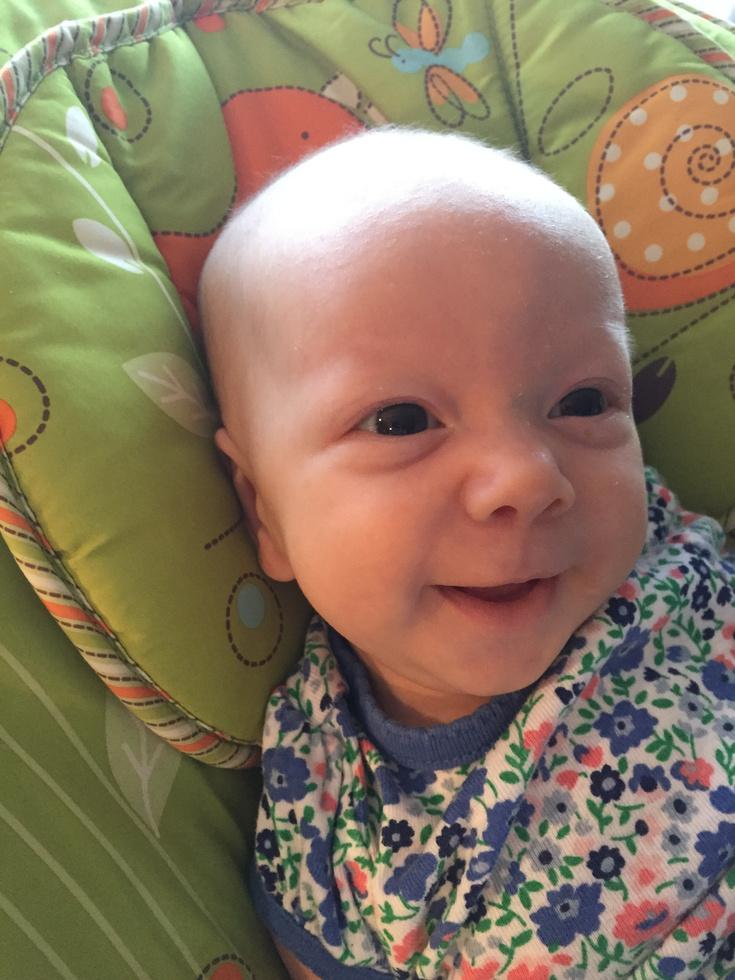
When the surgery pager sounded, time slowed, and a million thoughts raced through my head, “that wasn’t as long as we expected, is that a good thing or a bad thing? I hope everything went well We get to see our baby girl again soon. ”
We drove back to BCCH and they led us to a room to wait for the news. It felt like we were always waiting for something during this journey. Waiting for answers as to why our little girl wasn’t thriving, waiting for echo/x-ray/genetic test results, waiting for the surgery, waiting to hear news of the surgery, and waiting for our little girl to get better. We had to get used to waiting in ambiguity So, we sat and waited.
Our surgeon came in and told us that the surgery went well. She was already off the ventilator and breathing on her own. Her truncal valve looked good, the donor conduit was in place, and the patch between ventricles was done. Her thalamus was a normal size which meant the gene deletion syndrome was unlikely Many of the unknowns about her heart condition were answered after the surgery, and we had a sense of relief wash over us.
We were led into the PICU to see our little girl Even though they prepared us, we were taken aback by all the equipment, tubes, and bandages, but her sweet little eyes were reassuring She was so strong and doing very well considering what her little heart had been through.
The next morning, during rounds, we learned more about how the surgery went and what the next steps were
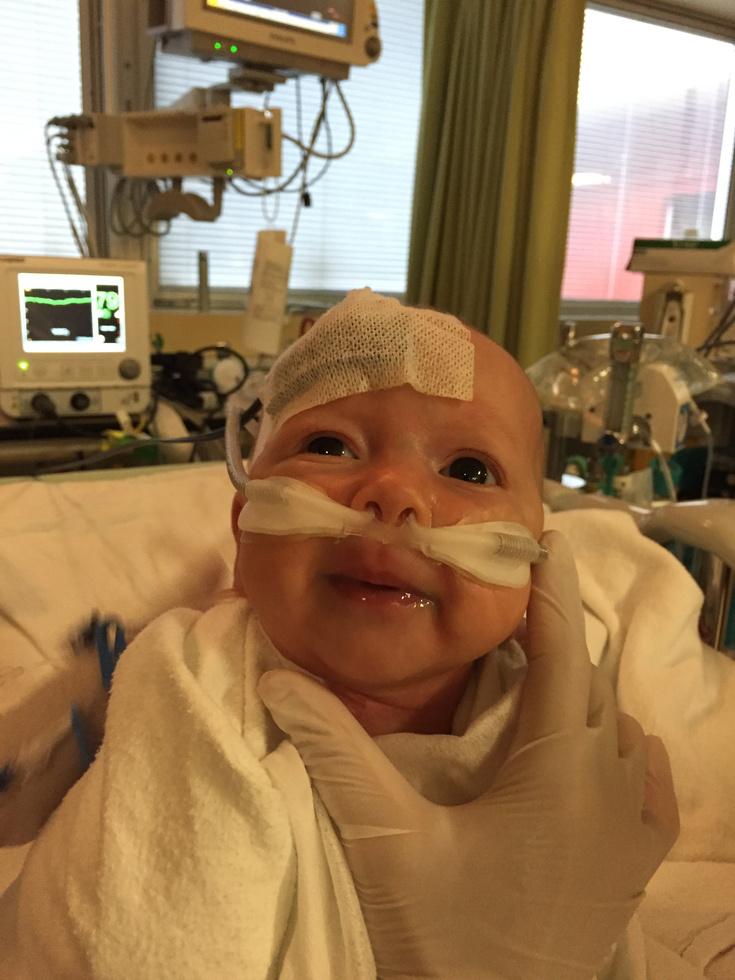
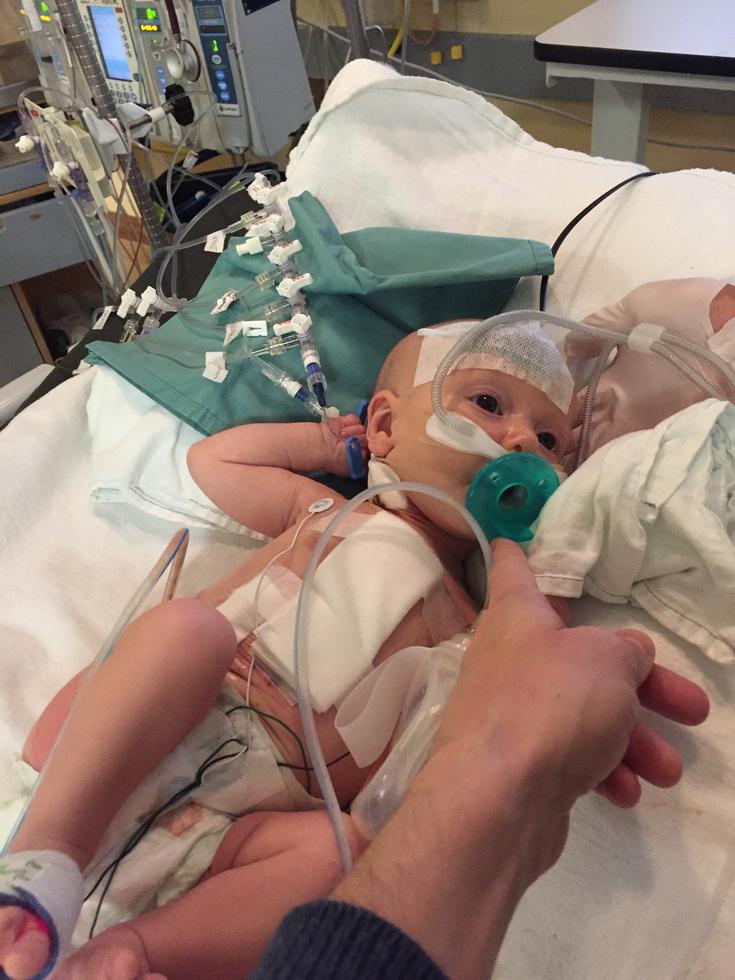
Ocea was trying to breathe on her own at the end of the surgery, Dr. Gandhi said he had rarely seen that so early The doctors were so impressed that there was talk of sending her up to the ward later that day. Dr. Gandhi met their optimism with a caution; she had just had major open-heart surgery and she would need to stay in the PICU for a couple more days.
We thought that the hardest part was over and that her recovery would be straightforward and according to “plan” but the hardest part of our family’s journey was yet to come. Ocea had a cardiac arrest the day after surgery, and she spent another 8 days in the PICU. In the most terrifying moment of our lives, her medical team responded as a “well-oiled machine.” Other complications that we feared came in waves and battered our confidence. The expected pulmonary hypertension arrived, and it was severe. We spent hours in vigil at her bedside filling her body with white light and picturing her healthy and happy in the futureWe put every thought and loving intention into our Ocea as her heart and lungs adjusted to their new configuration Her lung collapsed and we watched the panicked look on our daughter’s face as she struggled to breathe. Each complication was a challenge that her medical team worked skillfully to solve The power and precision of the medications was impressive. The routines and procedures were comprehensive and practiced Each specialty rotated through to manage her case and they wove us into the mix. It’s hard to express how fortunate we are to have this level of care and expertise in BC We realized, through this journey, that despite all the technology and knowledge, it is still a puzzle for the experts to solve. It requires patience, looking at the hints and ruling things out until they find the piece that fits.
It was an emotional roller coaster with all the complication lows and the beautiful progress highs: Ocea smiling up at us while drinking milk again; holding her after multiple days of minimal contact, her big sister Lumi holding her hand and the excitement of finally seeing her face without the oxygen tubes. The biggest high of all was being able to leave the hospital - although we didn’t go far (thanks to Ronald MacDonald house). Going for a walk in the fall sunshine with our daughter was a triumph for our family Ocea’s strength and all the caring, focused people wrought a miracle.
One of the hardest parts of this journey was all the unknowns. We didn’t get any warning or time to prepare. Going to Children’s Heart Network (CHN) events and meeting other heart children and their families has really helped. Connecting with other families and hearing their unique stories has created a community of resilience and support We can share in the milestones and challenges of our children.
The CHN organized conference was a real highlight They brought parents and medical professionals together to mix. We learned about the amazing progress that has been made in treatments and procedures which has led to more positive outcomes We also learned how well BCCH compares to other heart centers. There were many Informative sessions that supported families with different needs, but the highlight of the conference was the Hearts of Gold teen group, they stole the show with their youth panel It was inspiring to see so many teens living their best life!
Ocea especially enjoys the CHN Family Camp at Camp Thunderbird and being with her heart friends. Seeing older heart warrior children running around reassured us that Ocea could have a full and wonderful life And she is! It has been 7 5 years since this all began, and Ocea is a powerful little person with a beautiful heart.
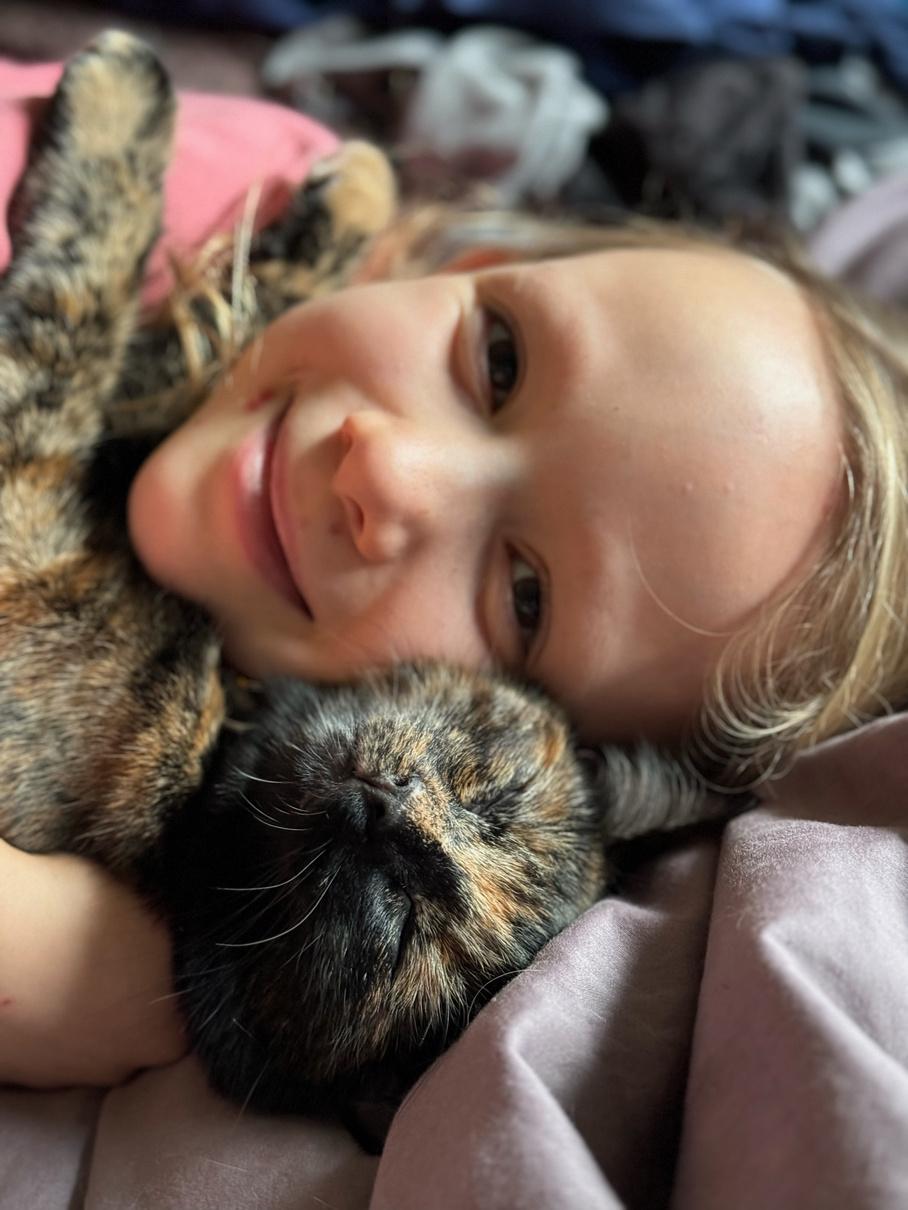
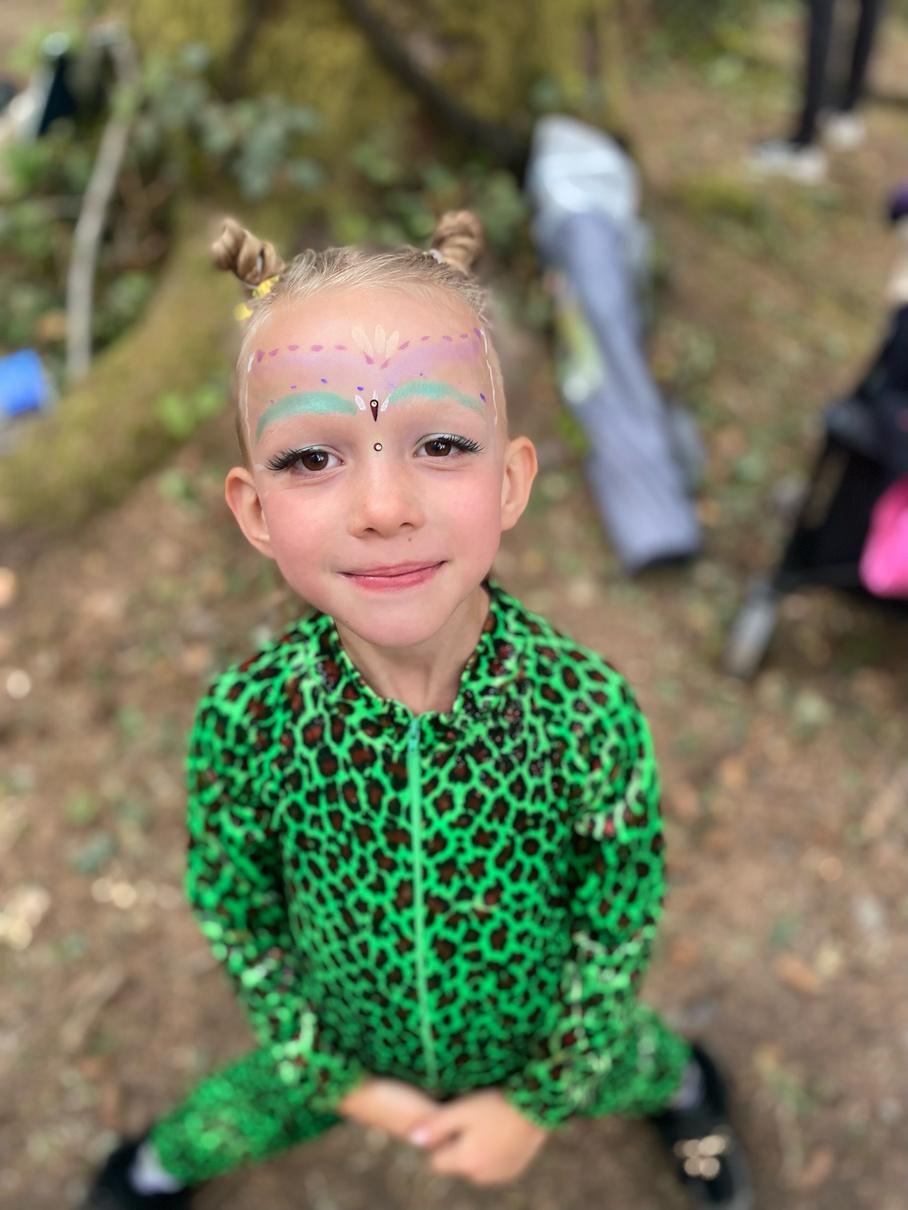
CHN Celebrates the Holidays!
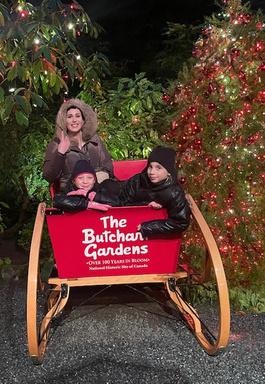
Okanagan
Vancouver Island
We were thrilled to host our Island event again at the gorgeous Butchart Gardens! On Dec 9th, families from Vancouver Island’s Heartbeat group met in the Carousel room to share in some festive fun. The children rode the gorgeous vintage merry-go-round while moms and dads were able to sip hot chocolate, chat and connect with other heart parents Many thanks to Megan Madsen, our Hearts of Gold youth group coordinator, for hosting and making it so special.
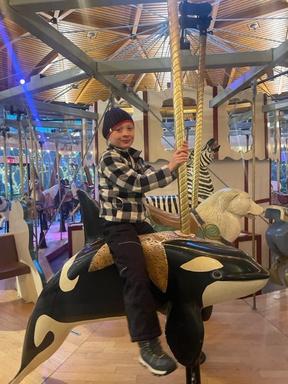
We were thrilled to host the 2nd Annual Pancake Breakfast in Kelowna! Long time heart mom, Deb Dachwitz, and her volunteers got together to plan a wonderful Breakfast with Santa on Dec. 9th at the Capri Hotel. Families came from far and wide to join in the fun and some took advantage of the “Take the Elevator Home” special room rate offered by the hotel and made a weekend out of it. After a plentiful buffet breakfast, some crafts and cookie decorating a very special guest arrived! Heart parents made new connections and children made new friends leading the way to many more fun Okanagan CHN events. If you live in the Okanagan and have an idea for a spring or summer CHN event please email us at saitken@childrensheartnetwork org
Lower Mainland
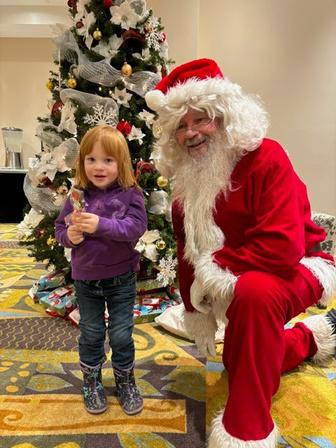
This year ’ s event was such a fun, festive day! We had over 250 heart family members join us at the Delta Grand Villa Hotel in Burnaby to celebrate the holidays The decorations were gorgeous, and a very entertaining show was put on by “Merlin the Magician ” Families got dressed up, enjoyed a fabulous brunch, and then took part in face painting, balloon animals, Christmas crafts, assessing the dozens of raffle prizes, and cookie decorating. This year we had a new special guest, “Elsa” from Frozen, part played by Emily Deimling, a child life specialist from BCCH and our new Hearts of Gold Coordinator The highlight for the little ones was undoubtedly the arrival of Mr. and Mrs. Claus, who spent time chatting with all the children, everyone providing big smiles for our amazing guest photographer, Dr. Jim Potts! We would like to thank Dr. Potts, Emily, our team of volunteers and the following sponsors, without whom this event would not be possible: The Delta Marriott Hotel, Fratelli Bakery, Daniel Chocolates, Dr. Potts and all the families and businesses that donated to the raffle.
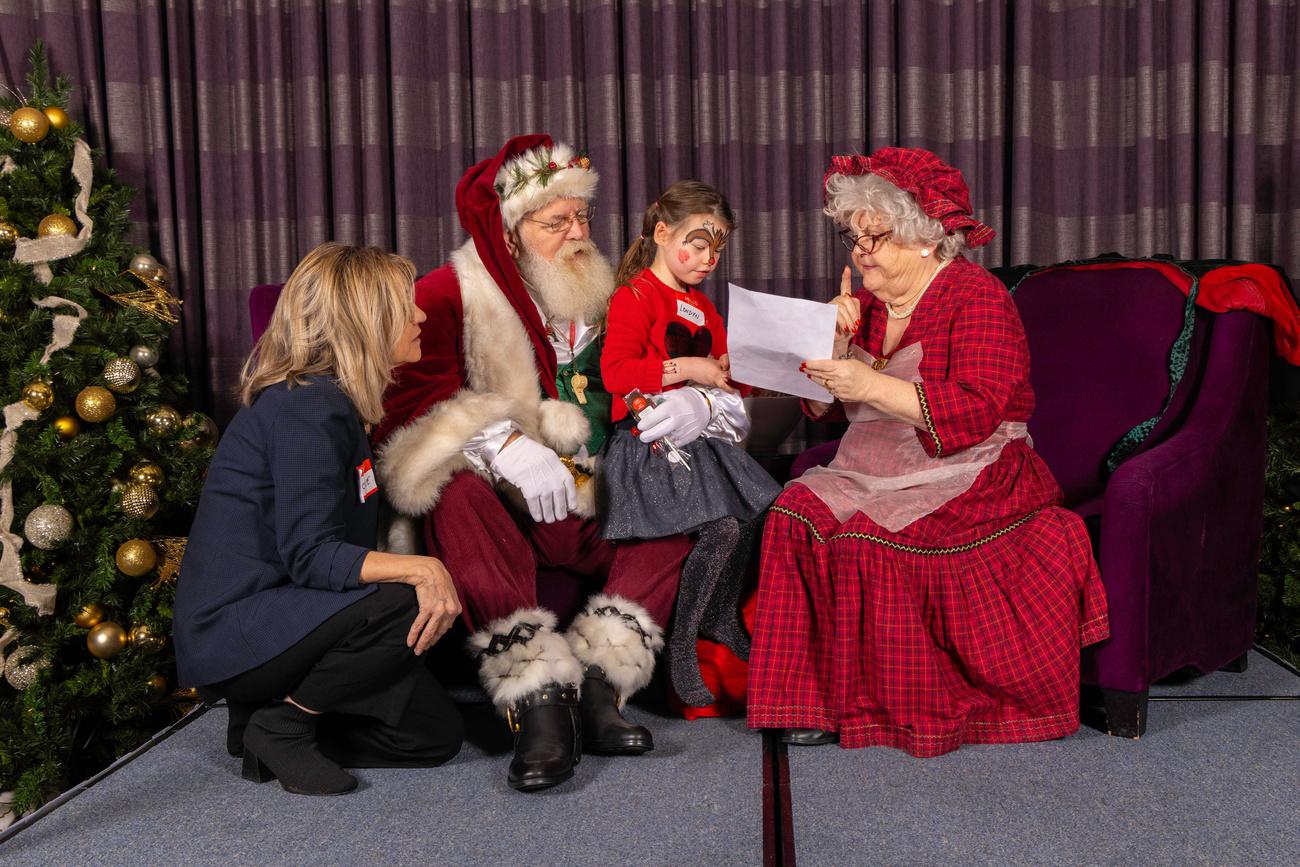
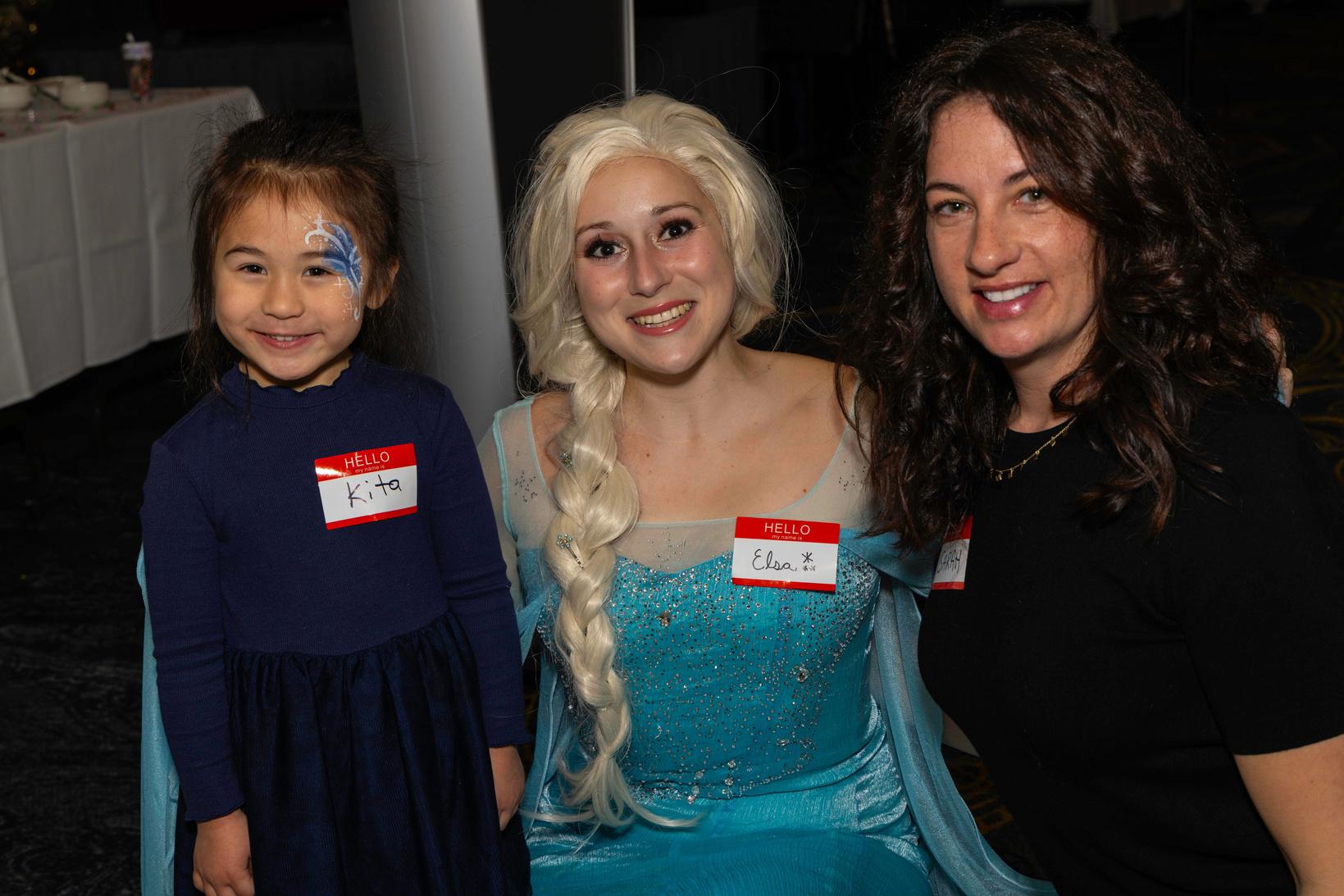
Meet Emily Deimling
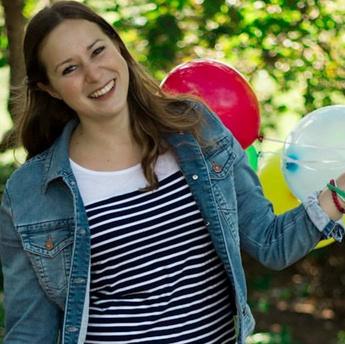
Hi Heart Families!
My name is Emily Deimling, I am a Certified Child Life Specialist, currently practicing at BC Children’s Hospital, and I have just joined the Children’s Heart Network team as the Hearts of Gold Coordinator.
I was born and raised in Ontario, in the small town of Windsor. I graduated from my undergraduate degree in Developmental Psychology with a thesis in Mindfulness in Youth and then I received my master’s degree in Child Life and Psychosocial Care from McMaster University. During my internship placements I had the opportunity to work with many different populations and children with different levels of complexity at both Winnipeg, and London Children’s Hospitals.
I was hired at BC Children’s about 2 years ago and I am really loving Vancouver. In my spare time I enjoy hiking, paddling, and simply being in the trees!
One of my other passions is singing. I enjoy performing in community theatre shows in my spare time (during the hiking off-season ) One fun fact about me is that I used to perform as a Disney princess for a party company!
Throughout my work experiences I have been grateful to have had many opportunities working with kids and teens in both a teaching and psychosocial capacity. One of my favourite work experiences was teaching English as a second language in Italy for three summers. I love my job at BC Children’s Hospital working with and advocating for children and teens so that they feel involved and safe in their care plan I am very excited to be joining the CHN as the Hearts of Gold Youth Coordinator. We have many fun social events planned over the next few months and l look forward to getting to know all the teens in our group.
Our most recent event, to celebrate the holidays, we had dinner at Romer’s Burgers in a private room with Karaoke and a White Elephant gift exchange game. It was so much fun! Over the May long weekend we will all go to Camp Zajac, which I hear is the highlight event of the year!
If you are a heart teen or know a heart teen between 13 and 18 years old please feel free to email me for more information. We would love to have more youth join our group!
Emily Deimling – chnheartsofgold@gmail com
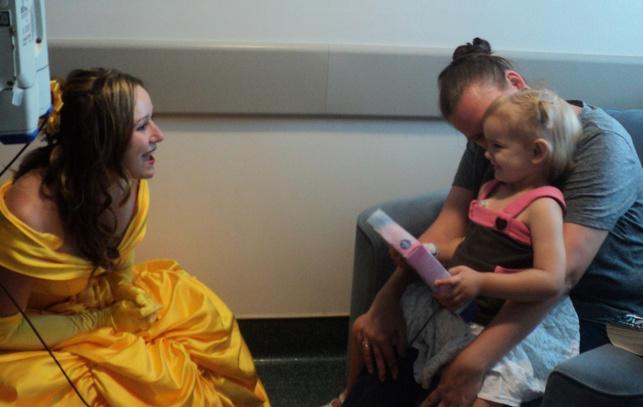
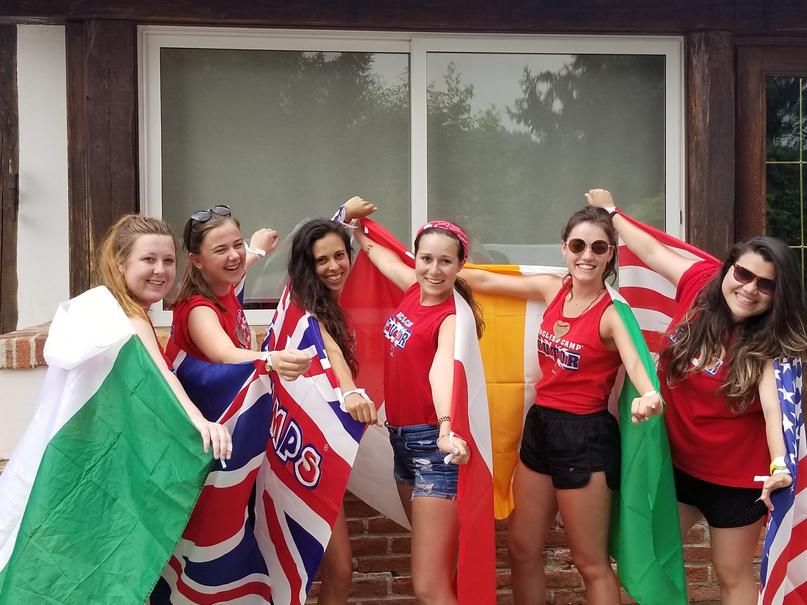
PEDIATRIC CARDIOLOGY TRAVEL OUTREACH 2024 SCHEDULE
January 10, 11, 12
Penticton
*January 22, 23, 24 Whitehorse
February 7, 8, 9 Kelowna
February 14, 15 16 Kamloops
*February 26, 27, 28 Prince George
March - Requested Williams Lake
March 20, 21, 22 Vernon
*March 26 ,27, 28 Terrace
April
*April
May
May
June Prince
June
June
Fraser Valley:
The BCCH Cardiology Team collaborates extensively with health care professionals in the Fraser Health Region A cardiologist, echo sonographer and nurse clinician travel to an outreach clinic held at the Children's Health Centre at Surrey Memorial Hospital every Wednesday and Friday Additionally, this team runs a Cardiology Outreach clinic once per month in the pediatric unit at Abbotsford Regional Hospital
*November
*November
*mid-week clinic requested All other clinics are held Wed/Thur/Fri
Transition –Knowledge is Power!
Children pass many milestones growing up, the first day of kindergarten, the liberty of becoming a licensed driver and -going-off-to-college or university, just to name a few Parents give the necessary “talks” about responsibility, risk, and behaviour. These transitions are thought of as rites of passage.
Prepping our youth for entry into adult health care should be no different than transitioning into college, university or into the workforce At some point, most individuals will assume responsibility for maintaining and managing their own health.There remains work to do to support youth to make successful transitions to adult heath care.
Some transitions can be emotionally challenging and stressful for both the youth and families Youth transitioning from paediatric cardiology to adult CHD care is challenging as they leave cardiology healthcare teams they may have known for their entire life and enter the unfamiliar world of adult health care.
CHD FACT
Research has show that barriers to successful transition to adult CHD care were emotional attachment to the paediatric cardiologist by parents (87%) and patients (86%). Provider attachment to patients and families was identified as a barrier by 70%.
Healthcare transition is a purposeful, planned movement of youth with chronic health conditions from family-oriented care (pediatric care) that relies on significant parental involvement in decision making to an adult-oriented health care systems that requires increasingly autonomous and independent decision making and skill of patient to manage their health, sometimes without access to as many interdisciplinary resources.
Healthcare transfer is a single point in time, when youth and their medical records move from paediatric to adult providers, which is mandated to occur at the age of 18 throughout much of Canada. Transition is a lengthy process ideally beginning by the age of about 10 years and continuing through to their mid-20s.
Healthcare transition is important for youth, whether they have a chronic health issue or not -- to optimize their lifelong health.
A Canadian study found 3 factors that are linked to a successful transition:
Health knowledge. Youth with CHD who are knowledgeable about their heart condition have increased comfort levels communicating with health care providers. Parental knowledge of their CHD also correlates positively with patient knowledge
Self-management Self-management of a health condition refers to a person ’ s ability to manage their health care needs. This would include completing tasks such as arranging medical appointments, filling prescriptions, and communicating and decision making with healthcare providers For more information visit our Tools and Resources section Self-advocacy. Self-advocacy is the ability of an individual to advocate for their needs For individuals with a congenital heart condition, selfadvocacy skills are necessary for communication with health care providers, managing their day-today activities and making effective use of community resources. Developing self-advocacy skills involves preparing youth to assume ownership of their health and supporting parents to facilitate this independence.
It was estimated in 2016 approximately 5200 teens in Canada would transition into the adult CHD system1, with this number continuing to grow each year. Guidelines recommend that all CHD patients be seen at least once in an ACHD centre to have their diagnosis confirmed by an adult CHD cardiology team. Those with moderate and complex CHD in the classifications will require active surveillance by an ACHD team. In some with simple CHD shared care with a community cardiology team may provide acceptable surveillance Transition care is important work for youth, families and health care teams. We must do it, and do it well.
Risk
Youth is associated with exploring social roles and identity formation; which can involve an increase in risky behaviours Youth experience transition in a much broader context such as changes with respect to friendships, romantic relationships, living situations, and academic and career decisions
There are differences between adult and paediatric health care models Paediatric care is family oriented and relies on significant parental involvement in decision making; in contrast adult care supports individual decision making and requires the individual to determine the role of their support systems
CHD FACT
Adults with moderate or complex CHD are at higher risk of other health issues such as heart attack, stroke, heart failure, diabetes and even premature death. Adults with CHD have higher rates of mental health challenges such as anxiety and depression.
Risks associated with an unsuccessful transition to adult care include:
Adults with moderate or complex CHD live at risk of increased cardiac and other health concerns. These risks include heart attack, stroke, heart failure, diabetes and even premature death
Pregnancy in women with CHD has increased risks to both the mother and the fetus. Contraception and pregnancy counselling should be discussed with your cardiology team for both women and men.
Adults with CHD have higher rates of mental health conditions; specifically depression and anxiety -- which are known to have an effect on their health-related quality of life.
Research has demonstrated that specialized ACHD care can significantly reduce mortality for adults living with CHD.
Youth with CHD frequently have long periods of stability and well-being, where physical symptoms and medications may not be part of their daily lives Absence of symptoms may result in underestimating the severity of their CHD, and they may not recognize the value of specialized ACHD care or the potential for long term complications Living with CHD may require invasive and specialized procedures at certain periods across the lifespan – involvement of an ACHD centre will provide monitoring and appropriate intervention as part of the regular surveillance.
Positive experiences of receiving ACHD care include: Increased autonomy and responsibility Opportunities to discuss adult focused health issues (eg, family planning)
See our Transition timeline recommendations for more information about the stages of Transition.
For helpful websites, toolkits and apps to assist youth, parents and families and facilitate the transition to adult CHD care at visit our Tools and Resources page.
Article re-printed with permission from Canadian Congenital Heart Alliance (CCHA).
References 1 Mackie et al: Transition and Transfer From Pediatric to Adult Congenital Heart Disease Care in Canada: Call for Strategic Implementation Canadian Journal of Cardiology 35 (2019) | 2. Lui, G et al.: Management of Cardiovascular Risk Factors in Adults with Congenital Heart Disease JAMA v3(6) (2014) | www childrens com | jamanetwork com | www healthychildren org | health usnews com | patientengagementhit com | www ncbi nlm nih gov | pediatrics aappublications org | www thehospitalist org | www cheo on ca | www childrenshealthcarecanada ca | www bcchildrens ca | www sickkids ca

Join us for an unforgettable evening at our 20th Annual Gala on April 26 at Terminal City Club. Celebrate two decades of success with gourmet dining, exquisite cocktails, and live entertainment in the heart of Vancouver. Dress to impress and be part of a truly extraordinary night!
Transition Stories
with Kate and Sydney Walker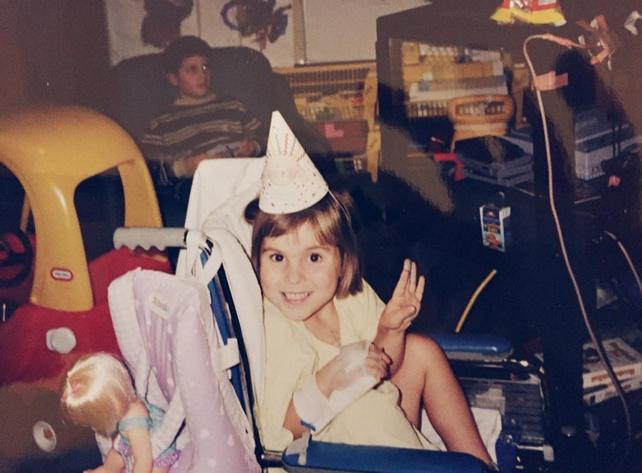
My name is Sydney Walker, and I am 29. I live and work in Steveston I’m a preschool teacher and I really enjoy working with kids.
I was diagnosed at birth with Hypoplastic Right Heart Syndrome, and I had my first open heart surgery a couple of days after I was born. I’ve had the complete Fontan repair and I had lots of challenges during the first five years of my life. I continue to be on medications, and I have yearly checkups at St. Paul’s Hospital, which are just a part of my life
When I was born, we were connected with another family, the Wiebe’s, whose daughter Jillian is a year older than me. She has Hypoplastic Left Heart Syndrome To this day we are still best friends, and we spend a lot of time together. We even got matching heart tattoos! We say that the two of us make up a complete heart, as she has Hypoplastic “Left Heart” and I have Hypoplastic “Right Heart”!
What were your biggest fears with transition into adult care?
Kate: Our biggest fear was the unknown and losing the relationships that we had made at Children’s Hospital (BCCH), everyone felt like family. It’s hard leaving what you ’ ve always known and what you are comfortable with As parents it was difficult supporting Sydney when we didn’t know what to expect ourselves.
Sydney: My biggest fear was being in a new environment where people didn’t know me, and they didn’t know my full medical history When I was at BCCH I felt like the doctors and nurses knew me well and they had a good understanding of all that I had been through. Most of the cardiology staff had known me for a long time so I really felt comfortable, and I trusted them. I used to tell people that I was looking forward to going to the hospital for sleepovers!
I had a hard time getting used to being the one responsible for making my appointments and contacting the hospital when issues arose. One thing that really helped me was giving permission for my mom to speak to hospital staff on my behalf when I am not available This has taken some pressure off me, especially as I am not always available to talk while I am at work.
How did the transition
go?
Kate: Transition happens during a time when much is changing in life. High school is finishing and there is the pressure of moving from being a teen to a young adult. It can be overwhelming at the best of times. It is difficult going to a new hospital where you don’t know your way around and when you don’t know anyone. We were lucky that Dr. Human (her cardiologist from BCCH) worked part-time at the PACH clinic at St Paul’s, and we were so happy to see Karen LeComte, a nurse we knew from BCCH ICU. Both familiar faces! One big surprise to us was that tests and appointments are often spread over a couple days which was different than what we were used to at BCCH. On a positive note, new patients are assigned a nurse clinician that oversees their care, it is great having a go-to person in the clinic.
Sydney: I was very nervous. Luckily, my friend Jillian had transitioned the year before, so she was able to tell me what to expect and could answer any questions I had. At BCCH all appointments are in one clinic, while at St Paul’s they are spread throughout the hospital, and it can be difficult to figure out where you need to be I think it would be helpful for teens going to adult care to be connected with someone who has already been through it It could also be helpful for parents to connect with other parents that have previously transitioned with their child.
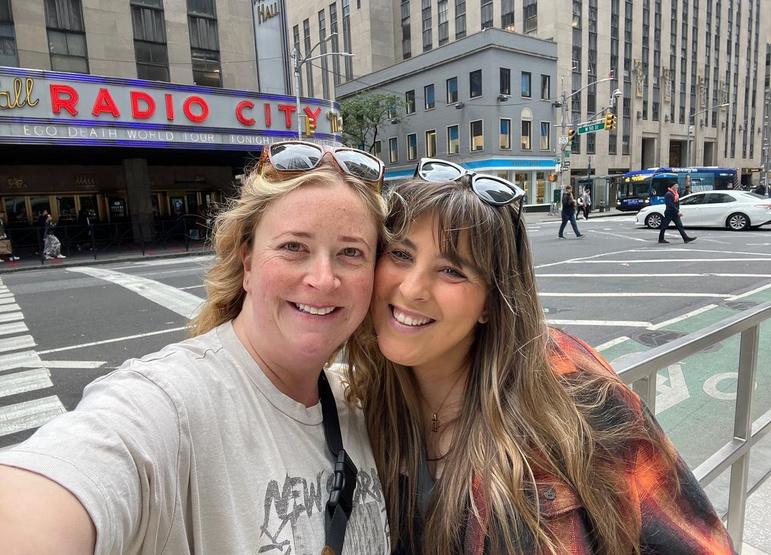
What is one piece of advice that you would give to someone about transitioning to adult care?
Kate: Ever since Sydney was very little, we encouraged her to speak for herself. If medical staff were asking us questions, then we would direct the questions to her. I would direct my eyes over to Sydney when I was being asked questions about her and would get her to answer them This has set her up to feel confident in dealing with many types of people and different situations. For example, she now feels comfortable pushing to have all her appointments completed in one day as it is difficult for her to get time off work. This has been a big step in her having her voice being heard and feeling listened to.
Sydney: My biggest piece of advice would be to not be afraid to speak up for yourself and what you need. You know yourself best and you need to advocate for yourself
For example, I have always really struggled with MRI’s. I have had bad reactions to the dye in the past and I feel very claustrophobic in the machine When I got to St Paul’s I made sure that they were aware of this. When the time came for me to have an MRI, we were able to come up with a plan and we compromised on a CT scan. It is not to say that I will never need an MRI, but at that time I advocated for myself, and they listened
Mila’s Fund in Action
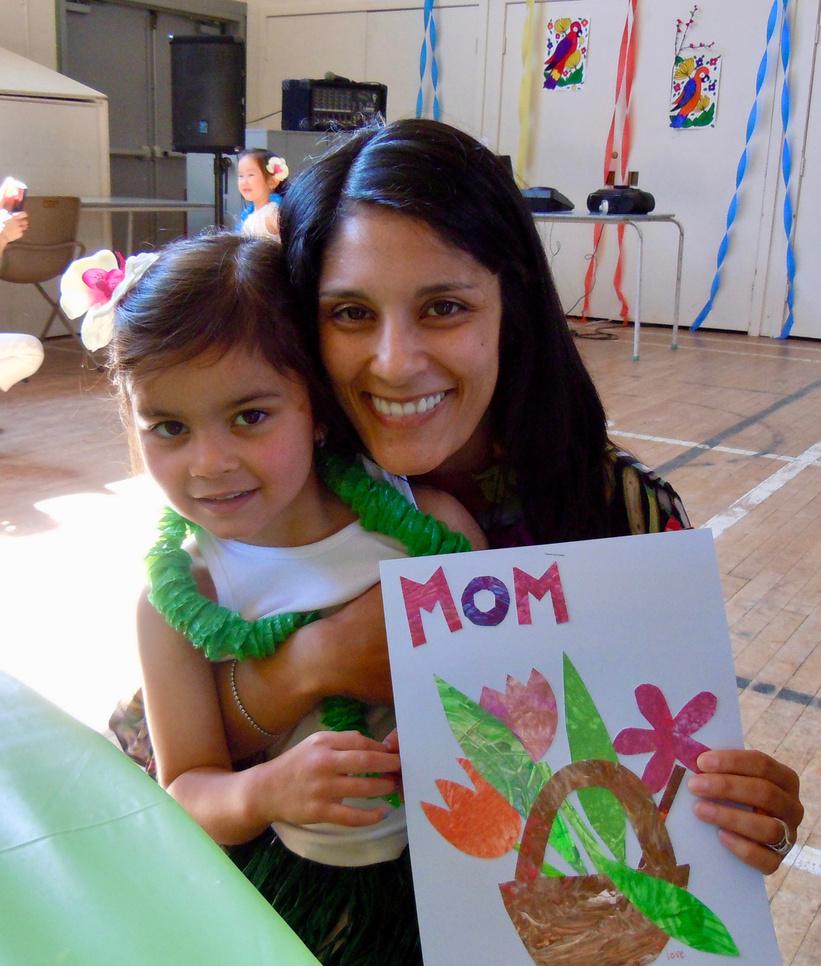
’ s Fund was started in 2013 in memory of a very precious heart angel, Dickout
parents, Lisa Lalsingh and Dustin Dickout, were overwhelmed by the pouring of love and support by family, friends, and others who wanted o something in Mila’s honour. One of the things that Mila looked ward to and would have loved was camp Mila’s Fund exists to provide ding that will ensure that the CHN will continue to provide quality p experiences for members’ children on an annual basis, and that all dren, regardless of family income or geographical region, have access pply for and enjoy CHN camp experiences In addition, Mila’s Fund be used, when other options do not exist, to support family ndance at Critter Cove or Family Camp by covering travel or ommodation expenses incurred in order to get to the site This fund ntially guarantees that CHN camps will continue to provide apeutic experiences for children in BC living with heart disease. This summer Mila’s Fund helped transport over 20 teens to Camp Zajac helped a family travel to attend a CHN Family Camp. We are grateful he support from so many people in Mila’s memory!
ou would like to donate to Mila’s Fund please visit: s://www.canadahelps.org/en/charities/childrens-heart-network/ change the drop down menu to choose Mila’s Fund
